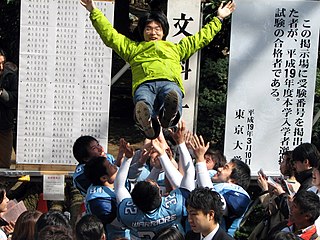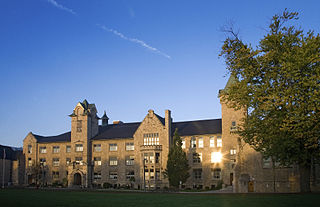
Vocational education is education that prepares people for a skilled craft as an artisan, trade as a tradesperson, or work as a technician. Vocational education can also be seen as that type of education given to an individual to prepare that individual to be gainfully employed or self employed with requisite skill. Vocational education is known by a variety of names, depending on the country concerned, including career and technical education, or acronyms such as TVET and TAFE.

A CEGEP is a publicly funded college providing technical, academic, vocational or a mix of programs; they are exclusive to the province of Quebec's education system. A loanword from French, it originates from the French acronym for collège d'enseignement général et professionnel, sometimes known in English as a "General and Vocational College"—it is now considered a word in itself.

Education in Canada is for the most part provided publicly, funded and overseen by federal, provincial, and local governments. Education is within provincial jurisdiction and the curriculum is overseen by the province. Education in Canada is generally divided into primary education, followed by secondary education and post-secondary. Education in both English and French is available in most places across Canada. Canada has a large number of universities, almost all of which are publicly funded. Established in 1663, Université Laval is the oldest post-secondary institution in Canada. The largest university is the University of Toronto with over 85,000 students. Four universities are regularly ranked among the top 100 world-wide, namely University of Toronto, University of British Columbia, McGill University, and McMaster University, with a total of 18 universities ranked in the top 500 worldwide.
A junior college is a type of post-secondary institution that offers vocational and academic training that is designed to prepare students for either skilled trades and technical occupations or support roles in professions such as engineering, accountancy, business administration, nursing, medicine, architecture, and criminology. Often times, those types of colleges offer 2-year associate's degrees that are intended for students that want to later transfer to a 4-year bachelor's degree to finish their undergraduate education, pending a C or better average in all coursework attempted, depending on the country. Students typically attend those types of colleges for 1-3 years, which is also dependent on the country.

A vocational school, trade school, or technical school is a type of educational institution, which, depending on the country, may refer to either secondary or post-secondary education designed to provide vocational education or technical skills required to complete the tasks of a particular and specific job. In the case of secondary education, these schools differ from academic high schools which usually prepare students who aim to pursue tertiary education, rather than enter directly into the workforce. With regard to post-secondary education, vocational schools are traditionally distinguished from four-year colleges by their focus on job-specific training to students who are typically bound for one of the skilled trades, rather than providing academic training for students pursuing careers in a professional discipline. While many schools have largely adhered to this convention, the purely vocational focus of other trade schools began to shift in the 1990s "toward a broader preparation that develops the academic" as well as the technical skills of their students.

Education in South Korea is provided by both public schools and private schools. Both types of schools receive funding from the government, although the amount that the private schools receive is less than the amount of the state schools.

Kingston Collegiate and Vocational Institute (KCVI) was a secondary school in Kingston, Ontario, Canada. Founded in 1792 by Reverend John Stuart based upon a grant for secondary education in the colony of Upper Canada, it moved to its location at 235 Frontenac Street in 1892. It is considered the oldest public secondary school in Ontario and the second oldest in Canada. The site and remaining buildings were purchased by Queen's University in 2021.
Education in the Polish People's Republic in years of its existence was controlled by the communist state, which provided primary schools, secondary schools, vocational education and universities. Education in communist Poland was compulsory from age 7 to 15.
The Thames Valley District School Board is a public school board in southwestern Ontario, Canada. It was created on January 1, 1998, by the amalgamation of the Elgin County Board of Education, The Board of Education for the City of London, Middlesex County Board of Education, and Oxford County Board of Education.

Higher education in Japan is provided at universities, junior colleges, colleges of technology and special training schools and community colleges. Of these four types of institutions, only universities and junior colleges are strictly considered postsecondary education providers. The modern Japanese higher education system has undergone numerous changes since the Meiji period and was largely modeled after Western countries such as Britain, France, Germany, and the United States of America combined with traditional Japanese pedagogical elements to create a unique Japanese model to serve its national needs. The Japanese higher education system differs from higher education in most other countries in many significant ways. Key differences include the method of acceptance, which relies almost entirely on one or two tests, as opposed to the usage of GPAs or percentages or other methods of assessment and evaluation of prospective applicants used in countries throughout the Western world. As students only have one chance to take this test each year, there is an enormous amount of pressure to perform well on it, as the majority of the time during a student's senior high school years is dedicated to performing well on this single test. Japanese high school students are faced with immense pressure to succeed academically from their parents, extended family members, teachers, guidance counselors, peers, and society at large. This mindset is largely based on a result of a traditional society that has historically placed an enormous amount of importance on the encouragement of study on top of the merits of scholarship and benefits of pursuing higher education, especially in an education system that places all of its weight upon a single examination that has significant life-long consequences on one's eventual socioeconomic status, promising marriage prospects, entrance into a prestigiously elite white-collar occupation, and a respectable professional career path. Unlike higher education in some other countries, public universities in Japan are generally regarded as more prestigious than private universities, especially the National Seven Universities.

Bristol-Plymouth Regional Technical School is a vocational high school located in Taunton, Massachusetts, United States, that has been in operation since September 1972. Bristol-Plymouth is one of the three high schools in the city of Taunton, and enrolls roughly 1,200 students in grades 9 through 12. The school draws students from the towns and cities of Bridgewater, Raynham, Berkley, Taunton, Rehoboth, Middleboro, and Dighton. Because it is considered to be its own school district, it has an on-site superintendent as well as a principal and vice principal.

R. H. King Academy, formerly known as Scarborough High School, Scarborough Collegiate Institute and R.H. King Collegiate Institute is a secondary school and a de facto alternative school located in Scarborough, Toronto, Ontario, part of the Toronto District School Board. The school was established in 1922, then became a collegiate in 1930, renamed in 1954 and again in 1989. This school was named after Reginald Harold King, a Canadian educator and classicist.

Galt Collegiate Institute and Vocational School (GCI) is one of sixteen secondary schools in the Waterloo Region District School Board, located in Cambridge, Waterloo, and Kitchener, Ontario, Canada.

Cabalum Western College is a non-sectarian, stock institution of higher learning in Iloilo City, Iloilo, Philippines established by Dr. Jose Cabalum Sr.

Education in Angola has six years of compulsory education, under the Angolan Education Law (13/01) of 31 December 2001. Basic adult literacy continues to be low, but there are conflicting figures from government and other sources. It is difficult to assess literacy and education needs. According to 2015 estimates, the literacy rate in Angola is 71.1% . On the other hand, the university system has been developing considerably over the last decade.

Highbury College is a further education college in Portsmouth, Hampshire, England. It offers vocational and academic education and training, including apprenticeships, A-levels and foundation degrees.

West Side Career and Technology Center is a full-time Career and Technology Center located in Luzerne County at 75 Evans Street, Pringle, Pennsylvania. The school is home to students of Wyoming Valley West, Dallas, Northwest, Wyoming Area, and Lake-Lehman school districts in the 2008-2009 school year. The current principal is Rick Rava. The administrative director is Thomas Duffy from Dallas School District, who replaced the retired Thomas Viviano. Viviano replaced Nancy Tkatch, who resigned during the 2013–2014 school year amid an investigation into fraudulent uses of the school credit cards.

St. Joan of Arc Catholic Academy, formerly known as Jean Vanier Catholic Secondary School, is a Roman Catholic high school in the Eglinton East neighbourhood of Scarborough in Toronto, Ontario, Canada as a member of the Toronto Catholic District School Board. The school building was originally opened in 1965 as Tabor Park Vocational School (1965–1986) by the Scarborough Board of Education, which became the Toronto District School Board who leased the building to the MSSB/TCDSB since 1989.

In Canadian English, the term college usually refers to a career college, technical, trades, community college, college of applied arts or applied technology, or an applied science school. These are post-secondary institutions granting apprenticeships, citations, certificates, diplomas, and associate's degrees.
Secondary education in Italy lasts eight years and is divided in two stages: scuola secondaria di primo grado, also known as scuola media, corresponding to the ISCED 2011 Level 2, middle school and scuola secondaria di secondo grado, which corresponds to the ISCED 2011 Level 3, high school. The middle school lasts three years from the age of 11 to age 14, and the upper secondary from 14 to 19.


















